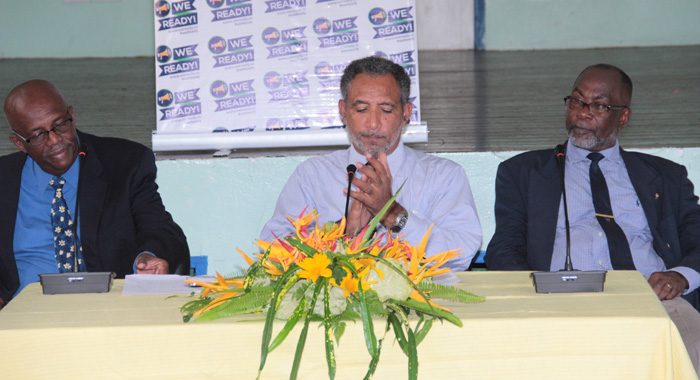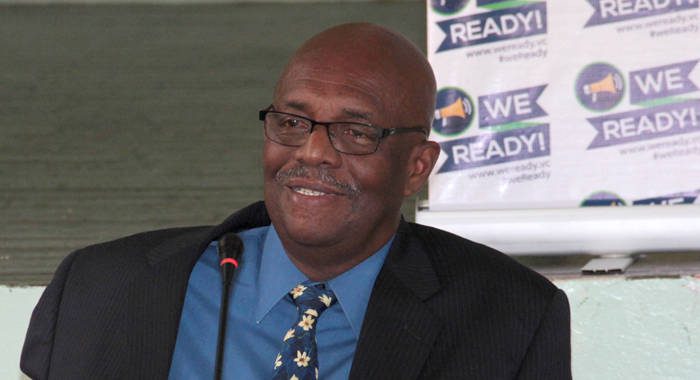By Kenton X. Chance
The government of Taiwan says it will open fresh talks with the main opposition New Democratic Party (NDP) in St. Vincent and the Grenadines, after the party announced on Aug. 23 that it is adopting the one-China policy and will switch ties from Taipei to Beijing if elected to office.
Spokesperson for the Ministry of Foreign Affairs in Taiwan, Eleanor Wang, told The China Post, an English-language newspaper in Taiwan, that her country cherishes its long-standing friendship and ties with Kingstown.
SVG remains among five CARICOM nations, three of which are also Organisation of Eastern Caribbean States nations that maintain ties with Taiwan, which China says is a renegade province awaiting reunification, by force if necessary.
The NDP and the ruling Unity Labour Party had been united in their support for Kingstown-Taipei relation with NDP president Arnhim Eustace expressing public support for Taiwan as recently as May 20.
Wang told The China Post that the government of Taiwan has cooperated extensively with the ULP in a number of fields, saying that the ruling party had been a strong supporter of Taiwan’s participation in international organisations such as the World Health Assembly, International Civil Aviation Organization and United Nations Framework Convention on Climate Change.
She also said that Taiwan had also maintained close ties with the NDP, noting that Eustace attended an event at the Taiwan embassy in Kingstown on May 20 to mark the inauguration of Taiwan President Tsai Ing-wen.
Wang added that at the event, the NDP president had reaffirmed his party’s commitment to maintaining diplomatic relations with Taipei.
Speaking on Hitz Talk, a local radio programme on Sunday, MP for Central Kingston, St. Clair Leacock, said the change in the NDP’s foreign policy was “not just an economic decision.
“I am not going to use ‘primarily’ either but I am going to say it is a significant consideration,” he said in response to a question from journalist Kenton X. Chance, who was also a panellist on the programme.
Leacock, along with MP for the Northern Grenadines, Godwin Friday, the other NDP vice-president, flanked Eustace when he announced the foreign policy shift at the NDP’s headquarters in Kingstown.

Leacock said on radio on Sunday that the NDP is “finding ourselves in accord with the United Nations’ one-China policy.
“We feel comfortable with that. I establish that. But we also believe that in pursuing this one-China policy, consistent with the UN, we do not evaluate that there is going to be any economic loss in doing the right things,” Leacock further said on Hitz Talk.
But asked if there would be any economic gain, Leacock said, “The chances are.”
Leacock was also asked to say when the NDP made the decision to adopt the one-China policy.
“I wouldn’t indicate that but I’d say this much to you: one has to be diplomatically responsible and I go at great length to let certain matters remain in chamber.”
He said it is a position that the NDP is taking as opposition “and this is the stir that has been created, as if we are in fact the government and I see the changes already in effect”.
But Burton Williams, a former minister of health under the NDP administration, noted that in politics, timing is critical.
“In the scheme of things, was it most expeditious, St. Clair, for us to take that decision, understanding that we cannot, as a party, give effect to the action at this particular time?” asked Williams, who has recently publicly criticised Eustace for failing to resign after leading the NDP to four electoral defeats, asked his fellow NDP colleague.
But the moderator, Israel Bruce, a lawyer who observers say is likely to be an NDP candidate in the next general elections, shielded Leacock from the questions.
Bruce said: “As important as the question is, we have to recognise that as a political organisation, as Burton said, strategy is important and you don’t come out on the street — no political organisation comes onto the street and announces its internal strategy.
“They speak to the policy outcome, and, the policy outcome in this case, is the announcement that a one-China policy will be adopted by the organisation and, of course, there will be internal reasons as to why, which, of course, St. Clair will not have the carte blanche to come out here and say,” Bruce said.
But Chance retorted, “I don’t think you should make that determination for him. We are here, eight months after general elections and in the elections, the NDP, as has often been the case, was criticised for ‘not having any policy’. The party has announced a [shift in] policy that has shocked –that the entire country has taken note of. So I think it is only fair that you allow Mr. Leacock to answer the question without trying to shield him.”
Bruce, however, said that he has a responsibility to ensure that the way the programme is moderated is proper.
Leacock said there were “downside risks” to the decision, saying that when such a position is taken in opposition, the government could figure “all is mine and then the Taiwanese also may take a position
that if you are against me, then why do I not put all my support [behind] the incumbent government and then ensure that the government that will continue to recognise me remains there forever”.
He, however, admitted that the question about the timing of the announcement is a “fair” one, adding that the public has questioned the wisdom of the announcement.
“So I answer you to say alongside our macro environmental issues that we are addressing when we come to office, if you believe it’s a matter of time, we are also readying ourselves for that electoral exercise,” Leacock said.
Chance asked Leacock about whether he was suggesting that the Taiwan embassy in Kingstown has involved itself in local politics.
The Central Kingstown MP said that if he made a statement to suggest that the Taiwanese are involved in local politics, that is an inaccurate interpretation.
“Because that will be a highly unprofessional statement to do — and undiplomatic too, to bring the embassy here into disrepute and I wouldn’t want to do that.”
He, however, said the relationship between the embassy and the NDP over the 15 years of the ULP administration, which came to office March 2001, has not been uniform.
“You have enjoyed different qualities of intimacy and relationship over the different representations.”
Williams said this was on account of the changes in administration in Taiwan, a point with which Leacock agreed.
The pro-independence Democratic Progressive Party was in office in Taiwan when the ULP came to office in 2001, but the DPP was voted out in 2008 and replaced by the Kuomintang (KMT), which was in turn replaced by the DPP in May, after January’s elections.
Bruce did not allow Leacock to respond to a question from Chance regarding whether the NDP was in possession of political intelligence regarding plans or considerations by other Taiwan allies within CARICOM to switch ties to China if the opportunity arises.






